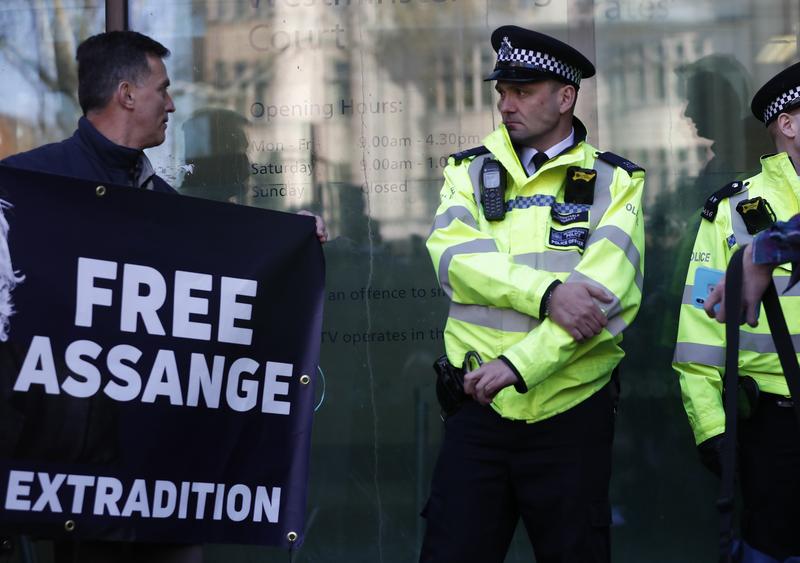Assange Under Arrest

( Alastair Grant / AP Images )
BOB GARFIELD From WNYC in New York, this is On The Media. Brooke Gladstone is out this week. I'm Bob Garfield.
[CLIP]
FEMALE CORRESPONDENT What you're are seeing on your screen right now exclusive images showing Julian Assange being carried out of the Ecuadorian embassy after his arrest. [END CLIP]
BOB GARFIELD Now there's an image for you. Julian Assange WikiLeak-er, fugitive, slayer of dragons and self described to shiner of light into the dark recesses of government power–being carried, bodily, from his former refuge in the Ecuadorian embassy in London.
[CLIP]
FEMALE CORRESPONDENT Police have confirmed he's being held on behalf of U.S. authorities. [END CLIP]
BOB GARFIELD And now he's facing prosecution for allegedly trying to help imprisoned leaker, Chelsea Manning, crack a government password–conspiracy to commit breaking and entering basically. So the humiliating eviction isn't the end of the Assange story. But that's not all it isn't. It also, most likely, isn't a blow to the free press. Despite the immediate hand wringing.
[CLIP]
MALE CORRESPONDENT It's a very serious assault on the first amendment. A clear attempt to rescind the freedom of the press essentially.
MALE CORRESPONDENT Every journalist in the world should be raising their voices as loudly as possible to protest and denounce this. [END CLIP]
BOB GARFIELD The press is, indeed, under attack in this country’S–but not in this case. Because WikiLeaks is not and has never been the press. Journalism reports or opines on events or phenomena along with history, context, multiple viewpoints and potential consequences. Wikileaks gets hold of information and dumps it indiscriminately. Absent context, absent motive and, certainly, absent thorough reckoning of consequences. This Assange himself told me a decade ago.
[CLIP]
JULIAN ASSANGE WikiLeaks is not a normal news organizations. We are a public service to whistleblowers who are trying to get the messages out. Our judgment would be a form of censorship of those whistleblowers. [END CLIP]
BOB GARFIELD He could have left out the word normal. He didn't run a news organization at all, any more than El Chapo ran a pharmacy. He's more like a fence. A broker of stolen property, which property is, admittedly, some types of legitimate and even priceless public interest–but sometimes, just loot. That's precisely why judgment is not censorship. Judgment is judgment. Weighing not just journalistic value but also the sources, motives, the context for the leaked information, and most of all, benefit versus risk. It's why most canonically journalists never report on troop movements in time of war because it immediately endangers lives. A standard that doesn't impress Julian Assange who postures as a transparency absolutist.
[CLIP]
JULIAN ASSANGE You either believe in that free press or you don't. And if you do, then people should act like it. And we like it because we do. [END CLIP]
BOB GARFIELD The thing is press freedom, defined under U.S. Law and best practices, doesn't permit libel or extortion or, by the way, burglary–digital or otherwise. With journalistic freedom, comes journalistic responsibility. And Assange, explicitly, disclaims that–at least where other people are concerned. While he preaches that all information, no matter its sources or dangers, is better public than secret, his own organization is shrouded in secrecy.
[CLIP]
JULIAN ASSANGE If too much is known about the journalists that are working with us, their telephone can be tapped and monitored and sources that are communicating with them can be monitored. The results of a slip up on our behalf could be fatal to some of the people that we work with. So we're very cautious to make sure that people can get at our sources by obtaining our [inaudible] communications records. [END CLIP]
BOB GARFIELD Can't argue with that at all. But do note the double standard. I mean you're either for exposing secrets or you're not. Right? Now in one of the more thoughtful red flags raised about the Assange prosecution, Washington Post columnist Margaret Sullivan observes that the encryption technology Assange is accused of abusing to hide his alleged conspiracy with Manning is a standard tool of real journalists. If he's prosecuted for using encryption software to communicate with a whistleblower, won't say Scott Shane of The New York Times faced the same threat. This is the dangerous precedent argument. But does it really hold up? The charges, after all, aren't about the encryption tool, they're about the password breaking scheme it obscured. Lizzie Borden was prosecuted for acts murdering her mother that triggered no alarm in the lumberjack community.
[MUSIC UP & UNDER]
BOB GARFIELD The prosecution of Julian Assange is not an attack on the press. It doesn't, necessarily, even pose a threat to WikiLeaks, which would be for ever invaluable if only it were more journalistic in its approach. What this case is about is one man deciding that the ends justify the means. And me, I look forward to his day in court.
[MUSIC UP & UNDER]
BOB GARFIELD Coming up, it's light bending, it's mind bending and it's a matter of extreme gravity. A black hole in living color. This is On The Media.

